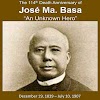The Bacolod City government recently announced the winning bidder for its solid waste collection.
I don’t know when this privatized system of garbage collection started in the city, but regardless of whether it is privately or publicly operated, there are some lessons that should be considered in solid waste management.
As we may all know, the solid waste management is the primary responsibility of local government units, as mandated by the Ecological Solid Waste Management Act of the country, that was enacted more than 10 years ago.
The basic principle of solid waste is the segregation of wastes from sources. It is quite unfortunate that the centralized system of waste collection, including in Bacolod City, is not being practiced. The city government should require the segregation of wastes beginning from the household, commercial and industrial establishments, schools and other facilities providing social services, government offices and other sources.
The solid wastes can be generally classified into biodegradable, compostable, reusable and recyclable. Most of the reusable and recyclable wastes are non-biodegradable. In some housing subdivisions in Metro Manila, non-segregated solid wastes are not being collected and they are return back to their sources. Those who are not practicing solid waste segregation should be penalized with fines. The collection of wastes by category should also be done by schedule. The barangay should be mobilized to ensure proper implementation of waste segregation.
It is very important that the city government should have materials recovery facilities where recyclable and reusable wastes can be delivered. These kinds of waste can then be sold or auctioned to entrepreneurs, who are engaged in recycling businesses. This is the concept of turning waste into cold cash.
On the other hand, compostable materials shall be delivered in an area where proper composting can be done. In return, organic fertilizers can be produced and may be used for the city’s greening program, or it can also be publicly sold, too. If this is the case, only other biodegradable materials are left for dumping in sanitary landfill.
These three disposal systems shall be placed in one location and may, in fact, be turned into a beautiful tree park and learning center for solid waste management. While it may be that simple to say, the proper solid waste management program, in reality, is quite difficult to implement.
It is therefore necessary that awareness and education campaign should be implemented, along with the empowerment of barangay officials to take the lead in seriously enforcing regulations related to solid waste management.
I do believe that each barangay has tanods who may as well be designated as solid waste enforcers in the barangay. Barangay officials should reach out to the different homeowners associations to implement the proper waste disposal. These associations may be able to provide guidelines on waste disposal among their members. For example, each household should be required to have their own trash bin for each category of wastes, or a group of households may do it together.
I guess this is much workable in housing subdivisions, but challenging in residential areas that are outside subdivisions, especially in areas occupied by informal settlers.
The city government may further launch competitions among barangays for a well-executed solid waste management program.
But in the end, it is still a question of the willingness and cooperation of citizens and the political will of local officials to implement what is most needed in ecological solid waste management.*









0 Comments